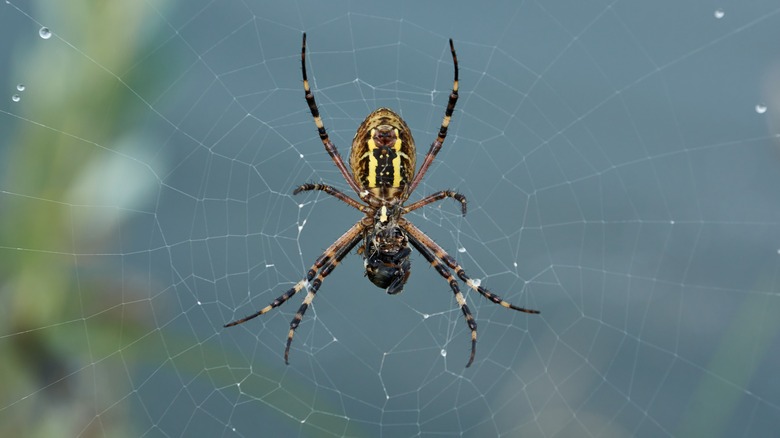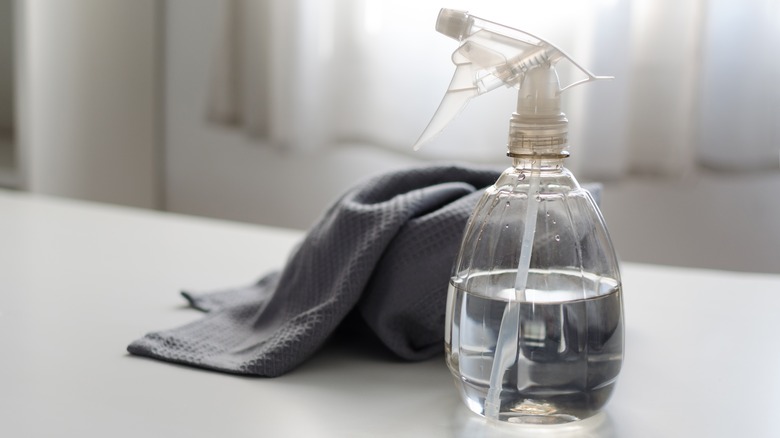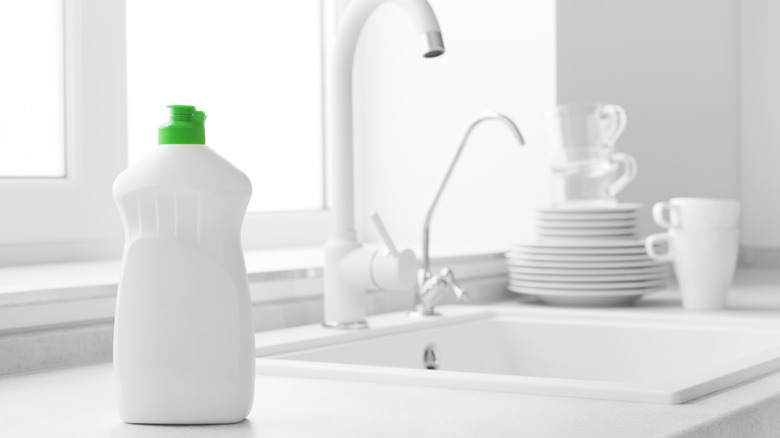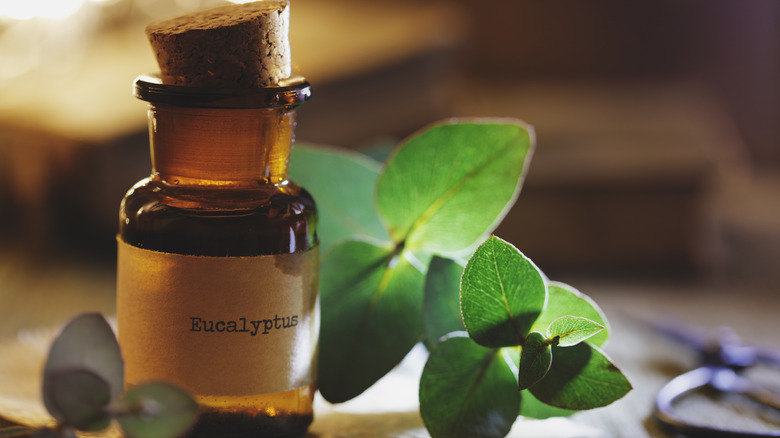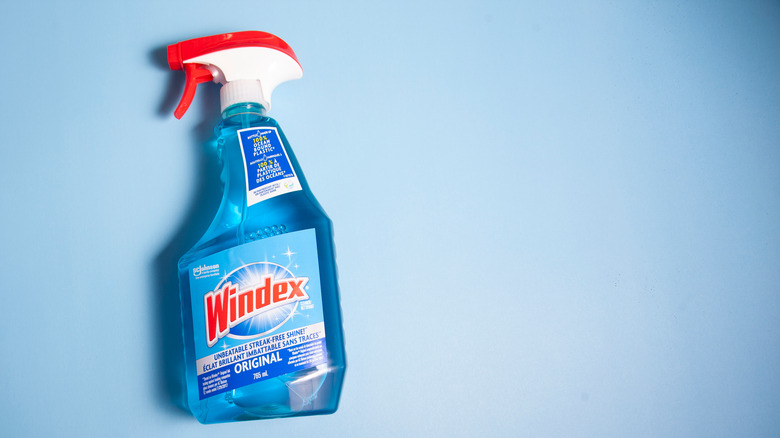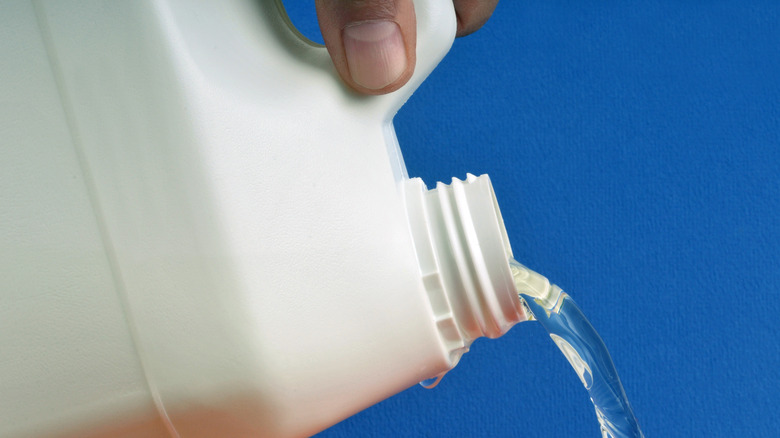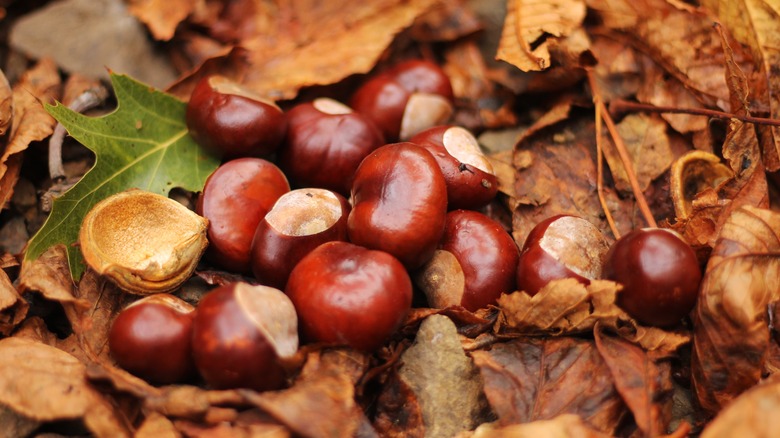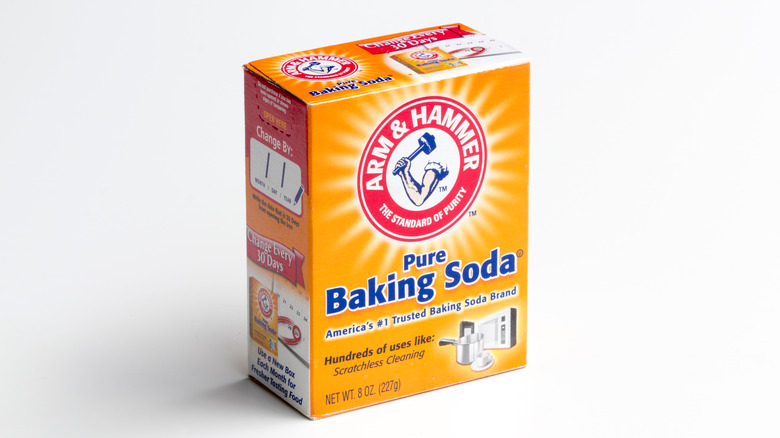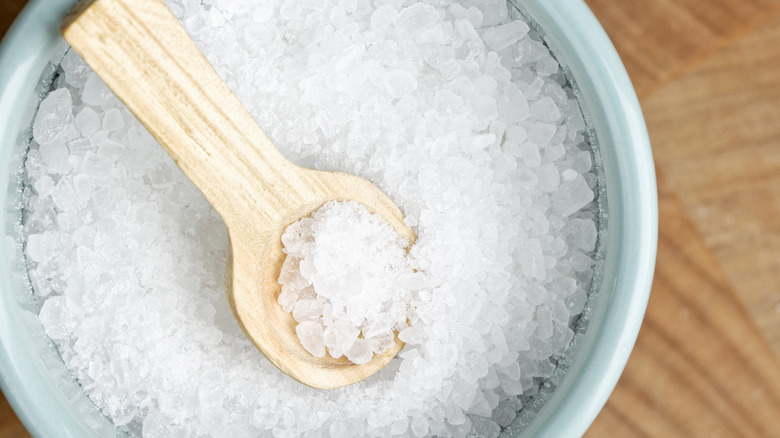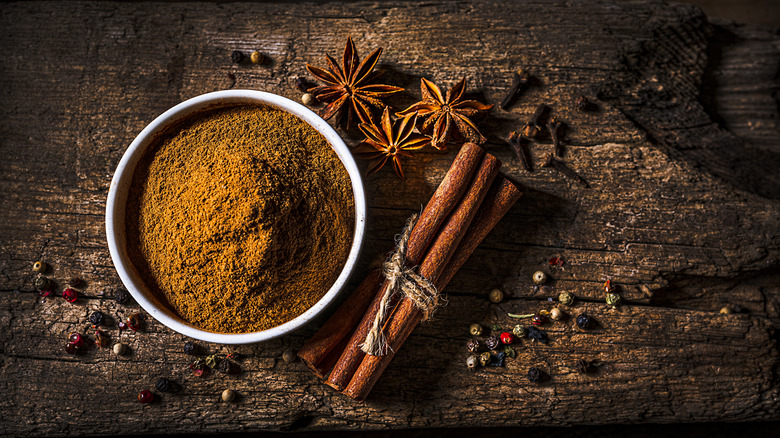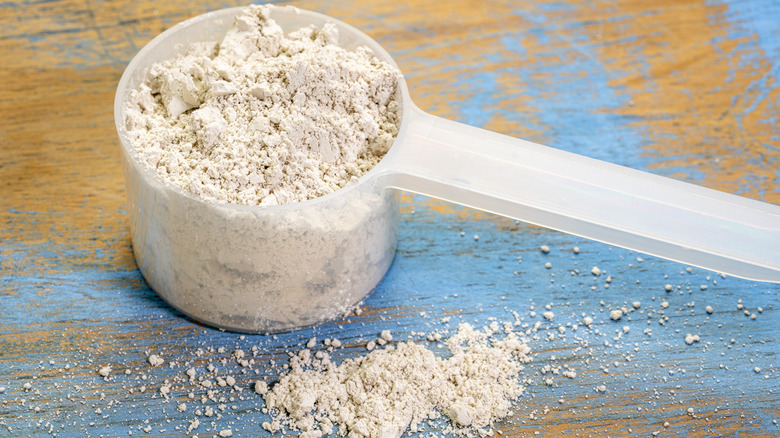Get Rid Of Spiders With These Common Household Staples
You work hard to maintain a clean and healthy home, but you occasionally find a few creepy, crawly, uninvited houseguests. Although most spider bites are harmless, some can cause severe allergic reactions, and we don't want the arachnids invading our homes. Spiders love to build webs and lay eggs in the quiet, hidden corners of closets and basements, as well as along baseboards and behind furniture. When they show up in your living space, you don't need to reach for the heavy chemicals in commercial insecticides. Instead, you can eliminate them with common products you already have around the house.
Several of the ingredients that you keep on hand for cleaning purposes can be used for killing and repelling spiders. These include white vinegar and Windex. Even dish soap and saltwater come to the rescue when you're fighting pesky arachnids. So while you might not be comfortable introducing chemicals from commercial insecticides into your living room or bedroom, there are plenty of everyday household staples that will take care of the problem for you.
Use vinegar to kill spiders in your home
You might keep white vinegar on hand as a natural ingredient for DIY cleaning solutions. But did you know that this household staple is lethal to spiders? The acetic acid in white vinegar burns and kills spiders on contact. To use this method, you can mix 1 part white vinegar with 1 part water in a spray bottle. Simply aim and spritz the solution onto spiders for immediate extermination. Additionally, you can spray the vinegar and water solution around windows, doors, cracks, and crevices where spiders might enter your home. Due to the dilution with water, the vinegar will not harm cats and dogs. If you don't like the smell of it, you can place a few strips of citrus peel in the bottle to infuse it, giving it more of a citrusy scent.
Feel free to spray this solution whenever you see a spider, but be aware that the acetic acid might damage some flooring materials. For this reason, you should test the solution in an inconspicuous corner before using it more widely in your home.
Kill spiders with a DIY solution of vinegar, dish soap, and water
Liquid dish soap is a common product that most of us keep in our kitchens. But when diluted with water and sprayed on a spider, it clogs the arachnid's breathing pores, and the spider dies. For a more highly effective spider-killing solution, you can combine it with white vinegar. The acetic acid in the vinegar adds an even more lethal component to the dish soap, producing an effective spider-killing potion.
To make a DIY solution, mix 1 cup of water with 1 cup of white vinegar and 1 tablespoon of liquid dish soap. Place all the ingredients in a spray bottle, and shake the bottle well. You can spray this mixture whenever you see a spider. As an extra precaution, you might spray any areas where you see spider webs. Don't forget also to spritz where they might hang out, including attics, basements, garages, closets, corners, cracks, and crevices.
Citrus peels and sprays will repel them away
Spiders are known to both despise and avoid the smell of citrus fruits. If you want to discourage them from taking up residence in your home, try rubbing orange, lemon, or lime peelings along the window sills, doorways, and crevices where spiders might enter. When you have leftover citrus peels from meals and snacks, you can rub them on the surfaces where you've seen spiderwebs. These locations might include out-of-the-way corners as well as the areas underneath large pieces of furniture, such as bookcases.
Alternatively, you can make a spider-repellent spray from lemon juice and water. Simply squeeze a lemon into a spray bottle full of water and shake it up. Then, spray the solution in areas where you've noticed spider activity.
Although this is an effective method for repelling spiders, it's not recommended for homes with pets. The juice and rinds of citrus fruits can be harmful to both cats and dogs.
The smell of cedar wood will also help
While they don't have noses, spiders possess senses resembling smell and taste, thanks to specialized organs in their legs. Cedar wood is a naturally repellent material for spiders because they hate the smell. On the flip side, most humans think that cedar gives off a fresh and pleasant fragrance.
To repel spiders in your home, you can spread a few cedar chips or blocks in the areas where you've noticed spiders or cobwebs. Prime locations include closets, dark corners, basements, and around light fixtures. As an alternative, you can sprinkle or spray cedar oil on surfaces where spiders might roam. Give special attention to windows, doors, cracks, and crevices where they enter your home from outdoors. However, be aware that the phenol in cedar wood and oil is toxic for cats and dogs if they ingest it. So, it's important to use them in areas where pets are not likely to chew on the wood or lick the oil.
To keep outdoor spiders from entering the house, you can spread cedar chips as mulch in the planting beds adjacent to your home. Cedar mulch provides an outdoor scent that is pleasant to humans as well as an attractive finishing touch for your landscape.
Spiders hate these essential oils
Many people use essential oils for multiple purposes in their homes. While we enjoy their pleasant scents, spiders are particularly averse to several types. Specifically, they hate the smell of peppermint, eucalyptus, cinnamon, tea tree, citrus, lavender, and rose essential oils. They do not kill the arachnids, but they will look for another home when they encounter these strongly scented essential oils. As long as the smell lingers around your home, spiders will avoid taking up residence. As an added bonus, all of these oils promote various health benefits for humans.
To employ them as a spider repellent, you'll want to spray them in places where spiders can enter the house and where they're known to hang out. Fill a spray bottle with 2 cups of water and add 10 to 12 drops of an essential oil that spiders avoid. Spray liberally in corners, behind furniture, in closets, and storage areas.
However, if you have cats or dogs living in your home, it's best to skip this method for repelling spiders. Although the essential oils are greatly diluted with water in a spray bottle for application, there is a risk of toxicity for pets.
Spritz on Windex to kill a spider
Sometimes, you're surprised by a spider crawling across the floor or up the wall. Your immediate reaction is to kill it. When this situation occurs, it's not necessary to have an insecticide on hand. Instead, you can reach into your stash of cleaning products and pull out the spray bottle with the blue stuff in it. Windex is readily available in many homes, and it comes to the rescue when you need to kill a spider. Spray it directly onto the critter in a large enough quantity to completely cover it. You'll notice that the spider slows down and then it dies.
The lethal effect of Windex on spiders is due to the ammonia and sodium dodecyl benzene sulfonate ingredients. These chemicals block the spider's airways, and the creature suffocates. For this reason, it takes a minute or more for it to perish, but increasing the amount of Windex causes it to die more quickly.
Keep in mind that Windex is not a viable product for preventing a spider infestation or deterring them from entering your home. Instead, it's an effective solution when you're faced with a surprise visit from a creepy, crawly home invader.
Mix bleach and water in a spray bottle to kill spiders
You can create a DIY solution to spray on spiders, their webs, and their potential dwelling places. Bleach contains sodium hypochlorite, an agent that kills bacteria, fungi, and viruses. This makes it function effectively as both a fungicide and a pesticide. Simply add 1 part bleach to 3 parts water in a spray bottle. To kill a spider, spray the diluted bleach directly onto the creature from a distance of 6 to 10 inches away. If your goal is to deter spiders from entering your home and taking up residence, you can spray the mixture around corners, closets, doorways, window sills, and crevices on a weekly basis.
It's important to exercise caution when using diluted bleach as a generalized spray for spiders. It can be toxic for children and pets, so you should take care of where you spray it and how you store it. To avoid inhaling the fumes, you should only use bleach in well-ventilated areas. Additionally, bleach corrodes metal materials, and it can stain or remove the color from the surfaces you spray it on.
Use chestnuts or walnuts to fix your problem
There is some evidence that spiders are repelled by the chemicals in the shells of chestnuts, horse chestnuts, walnuts, and the fruit of the Osage orange tree. Although some people say this is a myth, others attest that spiders avoid these items and refuse to lay their eggs in the vicinity. Although not scientifically proven, it's probable that spiders stay away from horse chestnuts because they sense the presence of saponin, which is a natural bug repellant.
To try this method for repelling spiders, you can place nuts or nut shells around your home, along baseboards, and in places where you observe spider webs. Additionally, you can scatter a few nuts on your window sills and other locations where spiders might enter the house from outdoors. It's not necessary to remove the nuts from their shells or to crush the shells. Simply scatter the nuts, and it should help your spider problem.
Get rid of spiders safely with baking soda
With the sensory receptors located on their mouths and along their legs, spiders can accomplish the equivalent of smelling odors. That is, they detect the chemical signals that are present in the air. One of the odors that spiders hate is the smell of baking soda. This is a common product that many people keep on hand for cleaning and deodorizing multiple areas around their homes. To repel spiders, you can sprinkle dry baking soda on floors, along baseboards and window sills, as well as in hidden places where the spiders like to build their webs. It's effective in small quantities, but you might need to reapply every week or two.
The dry baking soda will not damage surfaces and is safe to use in your home. If you have pets, especially small animals, you should be careful about applying it in areas where they might eat it. Ingested in small quantities, baking soda is safe. But it can be toxic to dogs and cats in large quantities, relative to their size. The same is true for babies and small children.
A saltwater spray kills spiders
Saltwater is a naturally lethal liquid when it's sprayed on spiders. As a matter of convenience, table salt is a common and inexpensive item that most people always keep in their kitchens. This makes saltwater a handy spider-killing solution, minus the heavy chemicals found in insecticides. If you see spiders in your home and you don't have specialized ingredients on hand, you can always reach for the salt in your kitchen cabinet to mix a spider-killing potion.
Create your DIY spider spray by stirring ⅛ cup of table salt into 1 gallon of water. Then, pour some of the solution into a spray bottle and spray it directly onto a spider to kill it. As an added bonus, saltwater works as a pesticide and deterrent when you spray it into areas where spiders build their nests and lay their eggs. Repeat the spray periodically to make your home an unattractive environment for spiders.
Place cinnamon sticks and ground cinnamon around the house
Check your pantry or spice rack. Do you have any ground cinnamon or cinnamon sticks? If so, they can help you ward off those unwanted houseguests. Spiders do not like the way it smells, so they will try to stay away from areas where it is present. Place the sticks strategically around the house, particularly in any areas where you have seen spiders. They should remain potent enough to deter the 8-legged pests for a few months. If you start noticing more spiders again, replace the sticks with some fresh ones.
Ground cinnamon can also help if you have spiders coming in through the windows. Sprinkle it along the window sill — or even door frames — to keep them from entering your home. One word of caution: cinnamon may stain surfaces, especially if it gets wet. So be careful about what surfaces you're sprinkling it on anywhere it may be exposed to moisture.
Use sliced onions to keep spiders away
Onions may make us tear up, but they can make spiders stay away completely. They have a very strong smell which the arachnids really do not like. If you don't mind the smell of onions too much, you can use them to help you rid your home of spiders.
Start by slicing a few onions. Then, prepare several bowls by filling them about halfway with water. Place the bowls around your home around the points where you believe the spiders are getting in through (such as windows or doorways). Because the spiders do not like the way the onions smell, if they start to enter the home, they are likely to turn right back around. Garlic, another pungent ingredient, is said to have a similar effect on spiders. So, you could even combine both ingredients to keep the pests out of the house.
Turn up the heat with some cayenne pepper
The saying, "If you can't stand the heat, then get out of the kitchen," could be revised to, "If you can't stand the heat, then get out of the house," when it comes to spiders. Cayenne pepper is another natural repellent for these web-spinners. The reason the spicy powder is so effective at repelling spiders, along with other bugs, is because of the compound capsaicin. According to the National Pesticide Information Center, capsaicin is toxic to many pests and can repel a variety of unwanted visitors.
Luckily, spiders are deterred by the common spice and try to stay away. Use this to your advantage by making a DIY spider repellent with some water and cayenne pepper. Combine the two ingredients, add them to a spray bottle, and apply it to entry points and other areas where you've seen a lot of spiders.
Spreading a thin layer of diatomaceous earth can kill spiders
If you happen to have some diatomaceous earth in your home, it can help you clear up your spider problem. If you're not familiar with the powder, it is a substance made up of fossilized remains of diatoms (very small aquatic organisms). Made from silica, the pieces of their skeletons are very sharp (while also being incredibly small). When spiders and other bugs come into contact with these tiny shards, they will dry out within a few days. The shards will puncture the spider's body and then the traces of it will absorb the fats and oils in their systems. Within a few days, any pests that have come into contact with it will die.
You can sprinkle diatomaceous earth around the home, particularly the entry points that you believe the spiders are using or other spaces where you frequently spot them. All you need is a thin layer. If you make it too thick, the spiders may stay away altogether. Be careful when applying the fine powder. You do not want to inhale the tiny shards. It's also best to keep children and pets away from areas where it is applied.
Try Lemon Pledge to deter spiders from sticking around
If you use Lemon Pledge to clean your wood furniture, it may be able to pull double duty and keep spiders away, too. There is anecdotal evidence that spiders are repelled by citrus scents. In fact, a McPherson College Department of Natural Science study released in 2020 found that d-Limonene, a component found in citrus oils, may be effective in repelling wolf spiders.
The reason many people believe citrus scents — and, therefore, Lemon Pledge — are effective has to do with a spider's sensory organs, which are on their legs. When a spider's legs come into contact with citrus fruits, they supposedly do not find them appetizing, and try to move away. However, some studies suggest that it is only a myth that citrus fruits work as a repellent. A 2018 study published in the Journal of Economic Entomology found that lemon oil did not work as an effective spider repellent. If you have some Lemon Pledge at home, there's no harm in trying it out to see if it works for you. Worst case scenario, it doesn't make a difference, but spiders may still not like the slick texture of a polished surface and stay away for that reason. At the very least, using this citrusy polish regularly as intended keeps your home clean and fresh-smelling. If you decide to try this trick, spray the polish in areas spiders prefer, such as quiet corners and dark spaces.
